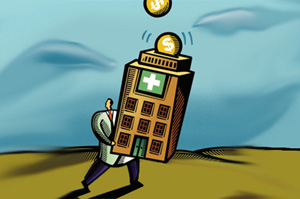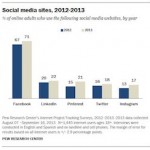 When someone dies of a treatable illness, fingers start pointing.
When someone dies of a treatable illness, fingers start pointing.
 When someone dies of a treatable illness, fingers start pointing. In the October 13, 2014 New York Times article, “With Electronic Medical Records, Doctors Read When They Should Talk,” Abigail Zuger notes that when a medical professional does not take the time to collect a patient’s history and medical records, the patient may receive a tragic misdiagnosis. The role of computerized medical records, and particularly the challenge of obtaining relevant details from vast amounts of narrative format, is central in the discussion.
When someone dies of a treatable illness, fingers start pointing. In the October 13, 2014 New York Times article, “With Electronic Medical Records, Doctors Read When They Should Talk,” Abigail Zuger notes that when a medical professional does not take the time to collect a patient’s history and medical records, the patient may receive a tragic misdiagnosis. The role of computerized medical records, and particularly the challenge of obtaining relevant details from vast amounts of narrative format, is central in the discussion.
The Problem with Many EMR’s
Ok, so we have a very comprehensive electronic medical record for this patient that includes information critical to diagnosis and the treatment plan. Those records also include a lot of detail that isn’t relevant along with a fair bit of duplication.
While taking the time to read an entire patient file may seem logical at face value (after-all we are talking about a sick patient here), the realities of the healthcare environment often make that impossible.
Zuger explains, “We are in the middle of a simmering crisis in medical data management. Like computer servers everywhere, hospital servers store great masses of trivia mixed with valuable information and gross misinformation, all cut and pasted and endlessly reiterated.” She later points out, “Ask the doctor to read, and the doctor will scan, skip, elide, omit and often forget.”
There is no argument that comprehensive documentation is important. Too much documentation that cannot be effectively searched and segmented for the situation at hand, however, quickly becomes a liability. Taking the time to wade through the entire patient record looking for key details gives doctors less time to spend with their patients.
Zuger claims that, “…Even if all the redundant clinical information sitting on hospital servers everywhere were error-free, and even if excellent software made it all reasonably accessible, doctors and nurses still shouldn’t be spending their time reading.”
 The solution that some physicians choose to the too-much-information problem is to ask the patient rather than read the file. That solution isn’t perfect either. Given multiple providers and treatment facilities, patients usually become frustrated after they have been asked the same question for the 3rd or 4th time.
The solution that some physicians choose to the too-much-information problem is to ask the patient rather than read the file. That solution isn’t perfect either. Given multiple providers and treatment facilities, patients usually become frustrated after they have been asked the same question for the 3rd or 4th time.
Zuger makes some good points. Overall, however, not reading or relying too much on the patient for information isn’t practical either. Patients will leave out important facts. Frustrating patients with repetitive questions may increase their stress and negatively impact their confidence in the care team that seems unable to share and retain key details about their condition.
Electronic Medical Records: Format Matters
A big part of this problem is not the fact that records have been computerized, but that records are poorly formatted and organized. Just taking paper narrative reports – blocks of text in the form of referral narratives, discharge summaries, lab and consultant reports, etc. – is still a “paper system”. The information has been captured digitally but it is in the same format designed for consumption on paper.
Personally, I can scan and read narrative text faster on paper than I can on computer screens. That doesn’t mean, however, I’d prefer to go back to paper charts.
EMR software that just digitizes narrative reports from paper get us only part of the way to a better solution. Full text search on narrative documents is a well-established technology good EMR’s are already offering. I can search for “allergies” and find that word (and similar word forms) where it appears in text content.
That technology on its own, however, only supports finding what the clinician knows to search for. It doesn’t make the process of scanning text to check for the unexpected (and critical) any easier. Text searching alone may also obfuscate key context – is the allergy new, associated with a specific scenario, etc.. Did that come up in my search results?
A second component of effective medical records is simply their format. Non-narrative “synoptic” report formats – have been shown to result in more complete reporting with fewer errors [1, 2]. These reports are based on structured data and templates. They are preferred by most report readers because they result in less volume than narrative formats, without losing detail.
The synoptic format allows physicians to see all the necessary data listed clearly in a compressed format. The equivalent details in narrative format often require 5 to 6 times the screen volume. Where comments are critical to interpretation of synoptic values, a summary section can be easily incorporated – which may even further reduce the volume of the report that must be reviewed for some readers.
Synoptic Reports
Synoptic reports aren’t meant to replace good, old-fashioned conversations with patients. They take the burden out of the process of reviewing patient records by reducing volume without reducing detail, and they achieve this while improving accuracy and completeness compared with narrative formats.








